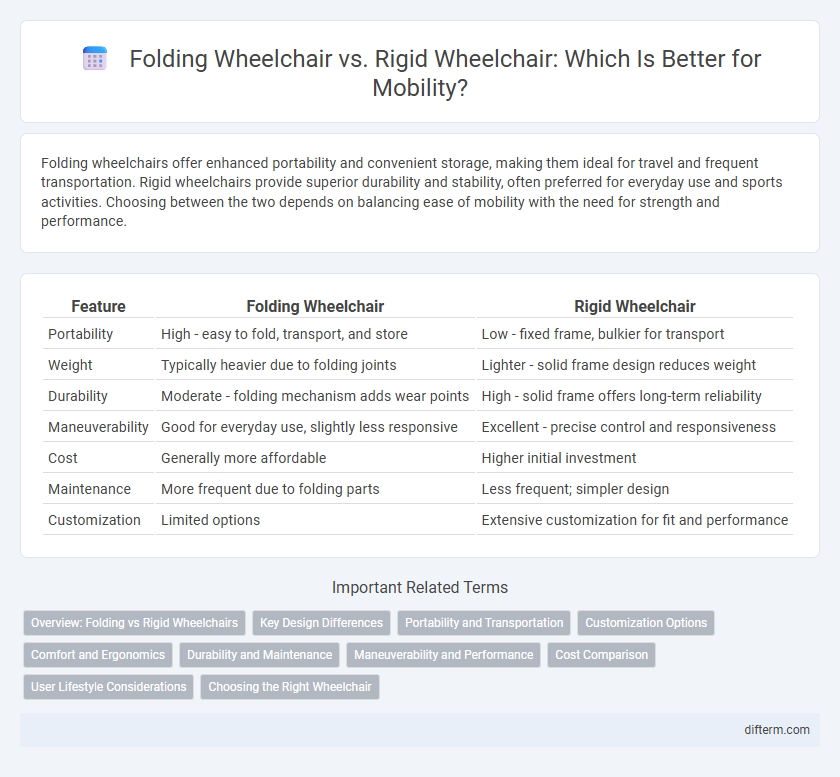Folding wheelchairs offer enhanced portability and convenient storage, making them ideal for travel and frequent transportation. Rigid wheelchairs provide superior durability and stability, often preferred for everyday use and sports activities. Choosing between the two depends on balancing ease of mobility with the need for strength and performance.
Table of Comparison
| Feature | Folding Wheelchair | Rigid Wheelchair |
|---|---|---|
| Portability | High - easy to fold, transport, and store | Low - fixed frame, bulkier for transport |
| Weight | Typically heavier due to folding joints | Lighter - solid frame design reduces weight |
| Durability | Moderate - folding mechanism adds wear points | High - solid frame offers long-term reliability |
| Maneuverability | Good for everyday use, slightly less responsive | Excellent - precise control and responsiveness |
| Cost | Generally more affordable | Higher initial investment |
| Maintenance | More frequent due to folding parts | Less frequent; simpler design |
| Customization | Limited options | Extensive customization for fit and performance |
Overview: Folding vs Rigid Wheelchairs
Folding wheelchairs offer enhanced portability and easy storage due to their collapsible frame, making them ideal for frequent travel and tight spaces. Rigid wheelchairs feature a solid, non-folding frame that provides superior durability, stability, and performance, especially for active users or sports activities. Choosing between folding and rigid wheelchairs depends on the user's lifestyle, transportation needs, and desired balance between convenience and strength.
Key Design Differences
Folding wheelchairs feature hinge mechanisms and removable parts, enabling compact storage and enhanced portability. Rigid wheelchairs have a fixed frame with fewer moving components, providing increased stability and efficiency in propulsion. The choice between these designs impacts maneuverability, weight, and user convenience in diverse mobility scenarios.
Portability and Transportation
Folding wheelchairs offer superior portability due to their collapsible frame, making them convenient for transportation and storage in vehicles or tight spaces. Rigid wheelchairs, while typically lighter and more durable, often require more space and specialized carriers, posing challenges during travel. Users prioritizing ease of transport frequently choose folding models for their compactness and adaptability.
Customization Options
Folding wheelchairs offer versatile customization options such as adjustable backrests, removable armrests, and foldable footplates, catering to users who require portability and adaptability. Rigid wheelchairs provide enhanced customization through modular components like customizable frame sizes, wheel types, and seating systems designed for performance and long-term comfort. Choosing between the two depends on prioritizing transport convenience versus tailored ergonomics and durability.
Comfort and Ergonomics
Folding wheelchairs offer enhanced portability but often compromise on ergonomic support due to their flexible frames and joint mechanisms. Rigid wheelchairs provide superior comfort through stable seating, better weight distribution, and customizable ergonomic features that reduce pressure points and improve posture. Users seeking long-term comfort and effective ergonomics typically prefer rigid models for daily mobility needs.
Durability and Maintenance
Folding wheelchairs offer convenience but often feature more joints and moving parts, which can lead to increased wear and require frequent maintenance compared to rigid wheelchairs. Rigid wheelchairs are constructed with a solid frame, providing superior durability and less susceptibility to frame flex, resulting in longer-lasting performance and reduced maintenance needs. Users seeking a balance of portability and low upkeep may prefer rigid models for their robust design and minimal repair requirements.
Maneuverability and Performance
Folding wheelchairs offer enhanced maneuverability due to their lightweight design and compact frame, making them ideal for tight spaces and frequent transport. Rigid wheelchairs provide superior performance with a stiffer frame that improves energy efficiency and responsiveness during propulsion. Users prioritizing agility and portability often choose folding models, while those seeking optimal speed and control prefer rigid wheelchairs.
Cost Comparison
Folding wheelchairs generally cost between $300 and $800, offering affordability and portability for users who require frequent transportation and storage options. Rigid wheelchairs, priced from $1,200 to $2,500, provide enhanced performance and durability but come with a higher upfront investment. The choice depends on budget constraints and specific mobility needs, with folding models favoring cost efficiency and rigid models ensuring long-term reliability.
User Lifestyle Considerations
Folding wheelchairs offer enhanced portability and storage convenience, making them ideal for users with active lifestyles that require frequent transportation and versatile mobility. Rigid wheelchairs provide superior durability and performance, suited for users who prioritize efficiency and stability during long-term daily use. Selecting between these options depends on individual lifestyle needs, including travel frequency, living space constraints, and physical activity levels.
Choosing the Right Wheelchair
Choosing the right wheelchair depends on individual mobility needs, lifestyle, and environment. Folding wheelchairs offer portability and easy storage, making them ideal for users who travel frequently or have limited vehicle space. Rigid wheelchairs provide enhanced durability, stability, and performance, suited for active users seeking robust support and long-term use.
folding wheelchair vs rigid wheelchair Infographic

 difterm.com
difterm.com